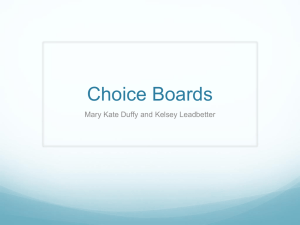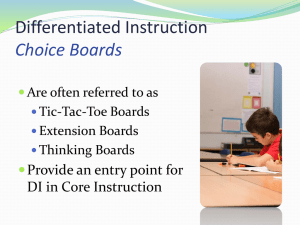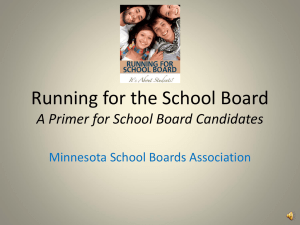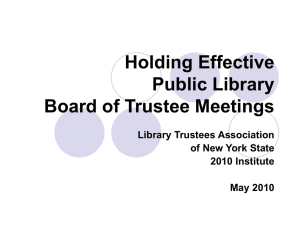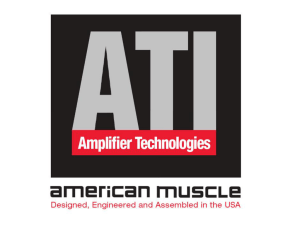AGBFLTrustees - State University System of Florida
advertisement
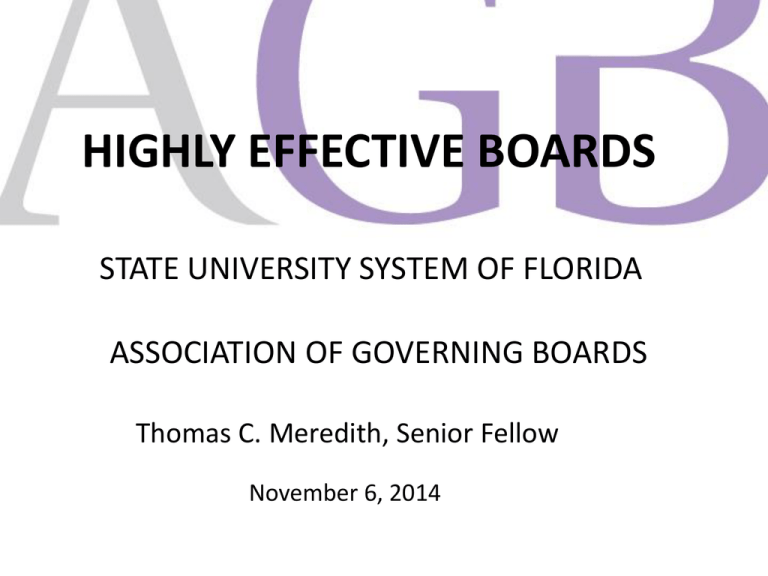
HIGHLY EFFECTIVE BOARDS STATE UNIVERSITY SYSTEM OF FLORIDA ASSOCIATION OF GOVERNING BOARDS Thomas C. Meredith, Senior Fellow November 6, 2014 How to Have a Mediocre Board • Under-engaged/Over-engaged • Avoid discomfort • Have the president frame the agendas • Have the chair try to be president • Avoid focusing on the work of the board 2 How to Have a Mediocre Board • Have the board’s executive committee make all the decisions • Use meeting time the same way every time • Have personal agendas • Focus on the past • Believe academic quality is only a faculty issue 3 How to Have a Mediocre Board • Don’t evaluate the president or provide constructive feedback • Avoid risk • Allow one board member to dominate, disrupt • Get the president to police board misbehavior 4 What Effective Governing Boards Do 1. Ensure the mission of the institutions is current (and aligned with public purposes) 2. Select the president 3. Work with and assess the president 4. Approve the strategic plan and monitor progress 5. Ensure fiscal integrity and preserve institutional assets 5 What Effective Governing Boards Do 6. Ensure the academic quality of the institution and its academic programs 7. Protect institutional autonomy, academic freedom and the public purposes of higher education 8. Ensure policies and processes are current and implemented properly 6 What Effective Governing Boards Do 9. Engage relevant constituencies appropriately with the administration 10. Are transparent and ethical 11. Assess own performance 12. Focus on being strategic in its deliberations and its decision making 7 Hallmarks of Highly Effective Boards 1. Actively engaged in governance work 2. High level of trust and candor 3. Engage multiple perspectives 4. Concentrate on governance, not management 8 Hallmarks of Highly Effective Boards 5. Focus on strategic issues that matter 6. Emphasize institutional perspective, not personal agendas 7. Listen to constituents but without veto 8. Enhance and nurture the legacy of the institution 9 Hallmarks of Highly Effective Boards 9. Recognizes its responsibility to students to provide a quality education 10. Balances advocacy and oversight 11. Commits to due process and academic freedom 12. Commits to adequate time and energy to do the board’s work 10 Hallmarks of Highly Effective Boards 13. Balance institutional needs and welfare with the state’s needs and priorities 14. Impose the highest ethical standards 15. Speak with one voice 16. Commits itself and the institution to due process and academic freedom 11 Hallmarks of Highly Effective Boards 17. Assess institutional leadership and the board’s performance for continuous improvement 18. Participate and enjoy the experience 12 Responsibilities of Individual Trustees 1. To seek to be fully informed. 2. To support the mission of the university. 3. To speak one’s mind at board meetings but support decisions made. 4. To understand the trustee’s role as policymaking and not management. (Results Not Process) 13 Responsibilities of Individual Trustees 5. To strengthen and sustain the president while asking probing questions and exercising critical judgment. 6. To communicate promptly to the president and board chair any significant concern or complaint and then let the president handle it. 14 Responsibilities of Individual Trustees 7. To defend the autonomy and independence of the institution. 8. To maintain an overriding loyalty to the institution and not to a constituency. 15 Responsibilities of Individual Trustees 9. To maintain a decent respect for the opinions of fellow board members and a proper restraint in my criticism of the system. 10. To not allow end runs, realizing it destroys TRUST. 16 Responsibilities of Individual Trustees 11. To recognize that only the president is the spokesperson for the institution and the board chair is the only spokesperson for the board. 12. To foster openness and trust among Board members, the administration, faculty, staff, students, state government and the public. 17 Responsibilities of Individual Trustees 13. To remember the system and its institutions were created to help the state and its citizens. 14. To recognize that no board member shall make any request or demand any action that violates the written policies, rules or regulations of the board or the university. 15. Only the body corporate can demand. 18 Responsibilities of Individual Trustees 16. To maintain the highest ethical standards and to never allow any conflict of interest. 17. To not rush to judgment and to give everyone the benefit of the doubt. 19 HOW TO BE (or become) A GREAT BOARD MEMBER 20 Great Trustees … • Be Engaged • Keep Learning • Know Your Colleagues • Keep Students First • Avoid the Shoelace Syndrome 21 Great Trustees … • Think Strategically • Advocate as Well as Oversee • Make Meetings Teaching Moments • Remember, the Body Corporate 22 Great Trustees … • Remember, You Are Always a Board Member • Learn the Board Culture • Respect Your Fellow Board Members and Earn Their Respect and Trust • Remember Policy, Not Management 23 Great Trustees … • Support Your President • Remember Institutions are Fragile, Watch What You Say and How You Say It • Remember, it is not about you individually • Read and be prepared • Have Fun and Enjoy 24 KEY WORDS 1. 2. 3. 4. 5. 6. 7. 8. TRANSPARENCY ETHICS TRUST ACCOUNTABILITY ENGAGEMENT PARTNERSHIPS LEADERSHIP RESULTS 25 CONSEQUENTIAL BOARDS: ADDING VALUE WHERE IT MATTERS MOST NATIONAL COMMISSION ON COLLEGE AND UNIVERSITY BOARD GOVERNANCE Released this morning, November 6, 2014 National Press Club, Washington D.C. 26 SEVEN RECOMMENDATIONS 1. Boards must improve value in their institutions and lead a restoration of public trust in higher education itself. 2. Boards must add value to institutional leadership and decision making by focusing on their essential role as institutional fiduciaries. 3. Boards must act to ensure the long-term sustainability of their institutions by addressing changed finances and the imperative to deliver a high-quality education at a lower cost. 27 RECOMMENDATIONS 4. Boards must improve shared governance within their institutions through attention to board-president relationships and a reinvigoration of faculty shared governance. Boards additionally must attend to leadership development in their institutions, both for presidents and faculty. 28 RECOMMENDATIONS 5. Boards must improve their own capacity and functionality through increased attention to the qualifications and recruitment of members, board orientation, committee composition, and removal of members for cause. 29 RECOMMENDATIONS 6. Boards must focus their time on issues of greatest consequence to the institution by reducing time spent reviewing routine reports and redirecting attention to crosscutting and strategic issues not addressed elsewhere. 30 RECOMMENDATIONS 7. Boards must hold themselves accountable for their own performance by modeling the same behaviors and performance they expect from others in their institutions. 31 Thank You Dr. Tom Meredith Senior Fellow, Association of Governing Boards of Universities and Colleges www.agb.org
